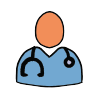Very often students ask me about the books they should use for the steps’ preparation. Here are a few principles and book names that I have gathered over the years from our students that prepare and take tests with various results.
Principles:
- Every book is valuable, however, everyone has a different taste and different ways to understand. Hence, you will have to choose your own set by reading various books.
- Read a topic for example pathology of asthma from all candidate books and see which one helps you the most in terms of style of writing, diagrams, distractions, and recall. Mind it, when you will read the same topic from each book, you will become better from one to the next book. You might incorrectly conclude that the last book you read the topic from is better. To counter this bias, read another topic in the reverse order. Mix it up for a few topics and choose your favorite writer.
- Each book has some great points and some points that are missing. If this was not the case then all of them will be the same one book. Furthermore, some books are textbooks, some are review books, some are notes, and so on. Don’t compare a textbook to a notes book.
- It is not necessary to choose a set that is by one company e.g. all Kaplan’s books, or all Becker’s books or all DrBeen’s topics, etc.
- Once you have a set chosen then stick to it. As each book is written differently, they all have different deficiencies. Accept this instead of running after every book and ending up with a pile of books that you cannot review in a timely fashion.
With these principles in mind, here is my favorite set to study and teach from. Apply the rules and tests mentioned above and select what you like.
- Foundational Book
- First Aid for USMLE. It will not help you ace the exam, it will make sure that you know the essential topics and can guarantee that you will pass if you know it cold from the beginning to the end.
- Biostats
- First Aid is sufficient. Add some questions that you attempt with a piece of paper and a calculator.
- Biochemistry, molecular biology, and genetics
- Hands down Kaplan. Don’t touch anything else.
- Behavioral Sciences
- High yield behavioral sciences with First Aid is sufficient.
- We have a set of psychiatry videos by Dr. Adam Jones that also covers high yield aspects. These are short (10-15 minutes) and to the point for the Steps.
- Microbiology and Immunology
- Immunology from Lange’s microbiology or my lectures.
- Microbiology from Microbiology made ridiculously simple with First Aid. Use sketchy videos if you like mnemonics and visual aids.
- I have done (DrBeen) a number of important microbiology lectures that are very valuable for Step 1 and Step 2 both.
- Pharmacology
- Kaplan’s pharma is great.
- Lange’s Ketzung and Trevor’s pharmacology is great too.
- One of the above not both.
- Physiology
- I love Kaplan’s physiology. Becker’s physiology is second.
- Board review series is great too.
- My own lectures for neuro, cardiovascular system, respiratory system, and renal are valuable as well.
- Choose one book to add to First Aid. Not all.
- Pathology
- I love Goljan’s pathology audio. I am not a super big fan of Goljan’s book. Its style of writing is less appealing to me. But, that’s just me.
- Pathoma is great for Steps, however, not that great to understand. Combine Goljan’s audio with Pathoma book and video.
- I am not a big fan of board review pathology. It turns me off. Test it for yourself.
- My lectures on CVS, Neuro, Respiratory, Immunology, and EKG are very valuable as well.
- Dr. Najeeb is great if you have time to listen for four hours to extract 15 minutes of solid understanding. If you don’t have this time and if you have already not used his videos during school then stay away. Same philosophy for my lectures too.
- Robbins is great, however, too long. Use mini robbins, but again, this book is not geared for the steps prep. Read some topics, compare with other books and then decide.
- I think Osmosis has some value, however, I have heard that it is too superficial for the exam prep. My point of view is that it is a good overview of the topics to allow you to consult better resources and grasp them easily. I will not bank on osmosis for the exam prep.
- Anatomy
- High yield anatomy with First Aid is sufficient.
- High yield neuroanatomy and clinical neuroanatomy are sufficient for the neuro part.
- I have heard that Dr. Najeeb’s head and neck and neuro videos are great. However, these are very lengthy as well. Maybe listen to the topics that you are finding difficult.
- My neurology videos are also one of the better resources, these are shorter than Dr. Najeeb but longer than I will like for review material. The same principle as for Dr. Najeeb applies here, if a topic is difficult, study it from my videos.
I will go over this list and add links in another day or so.
Happy studying.

